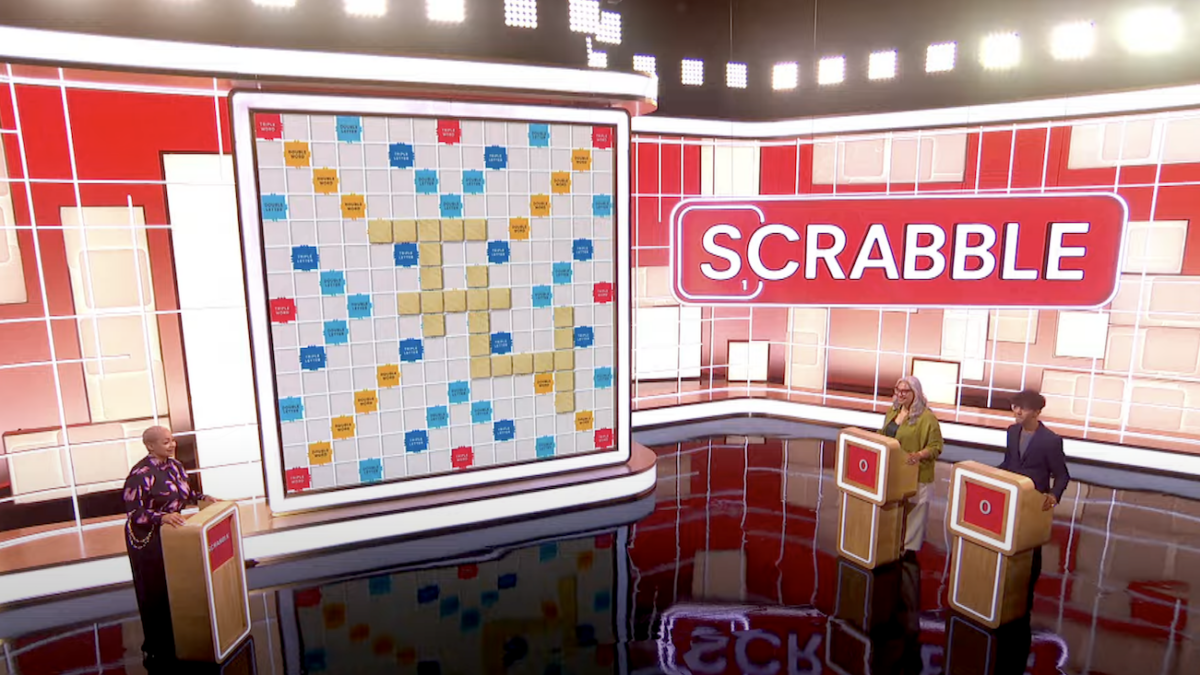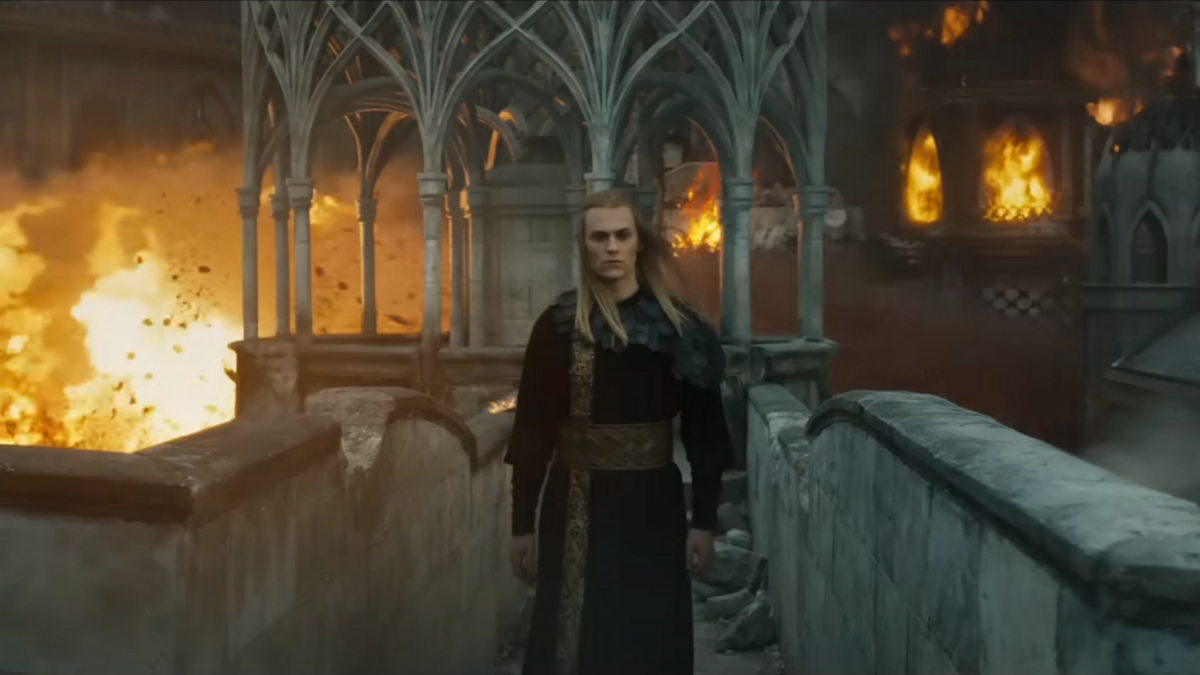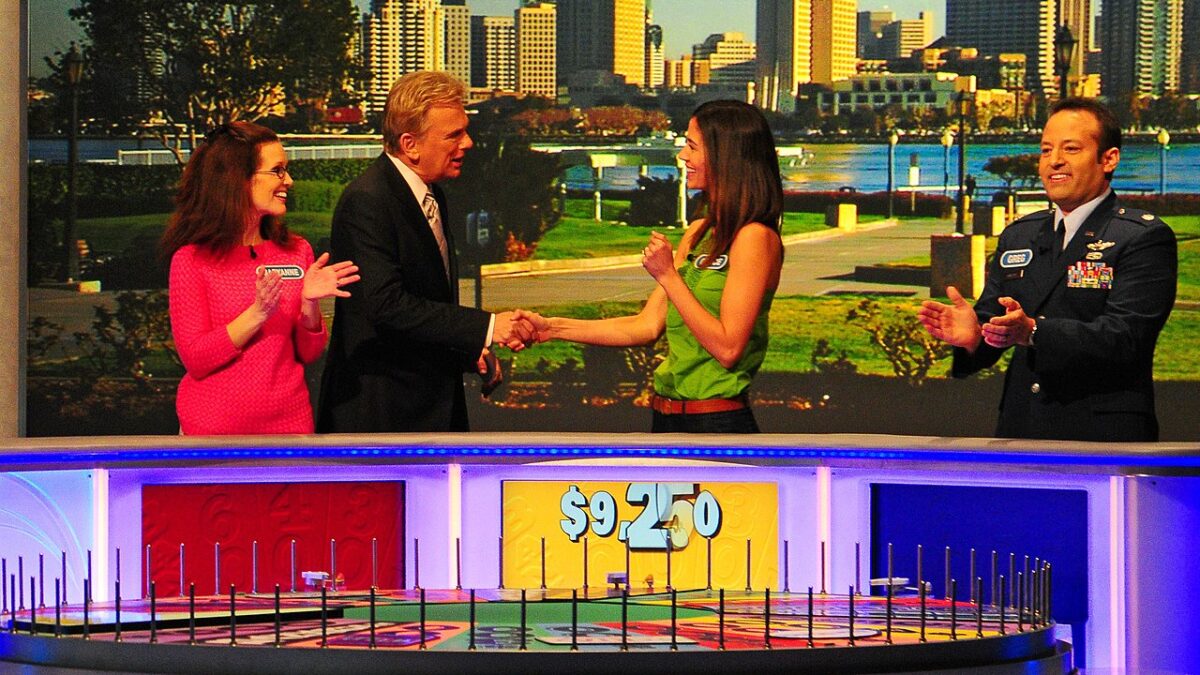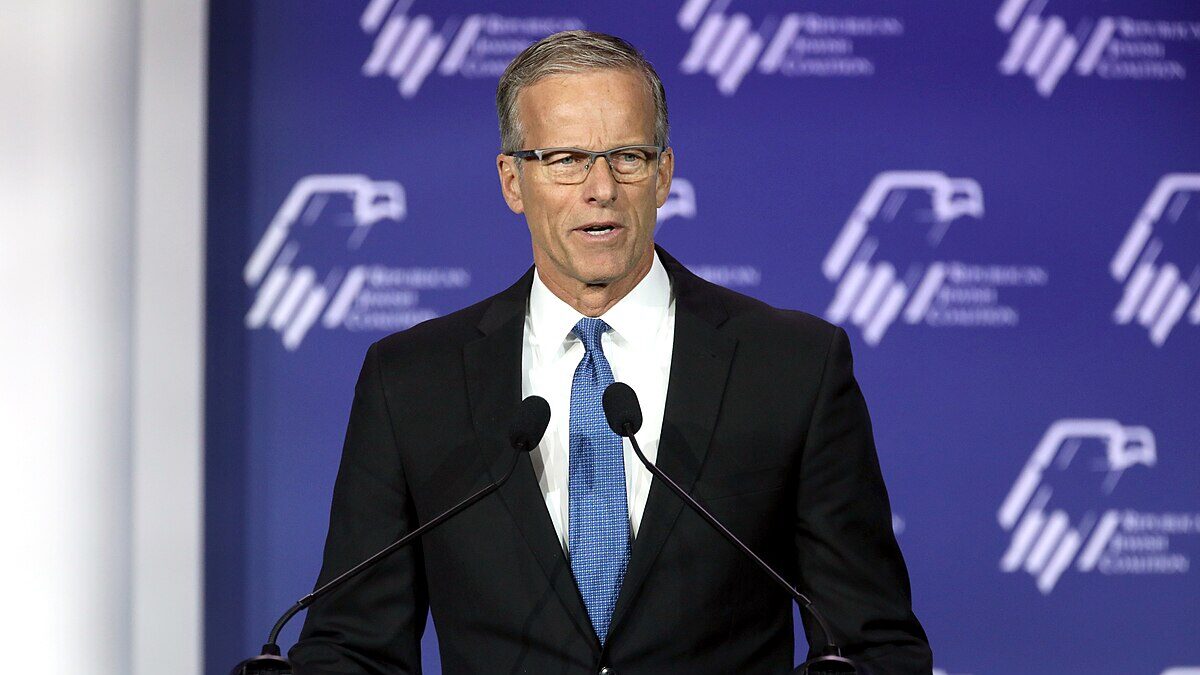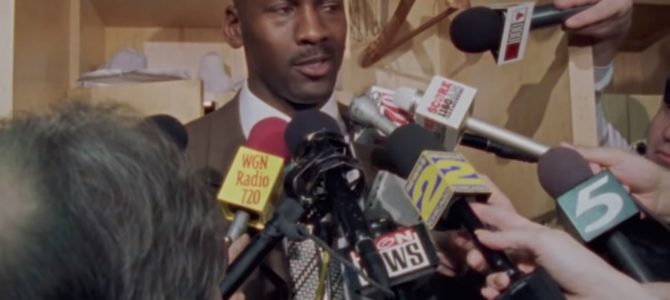
Some moments that seem powerful at the time become even more meaningful in retrospect — as the opening scene of this week’s episodes of the “The Last Dance,” the 10-part ESPN documentary examining the Chicago Bulls’s 1990s dynasty, demonstrates. At the end of last week’s episodes, the 1997-98 Chicago Bulls faced continued turmoil, with General Manager Jerry Krause insisting Coach Phil Jackson would depart at the season’s end, and the team losing to the Utah Jazz in a preview of what would become that year’s NBA Finals.
Recounting the 1998 All-Star Game, Jordan’s last as a Bull, the documentary focuses on the interplay between Jordan and Los Angeles Lakers guard Kobe Bryant. Jordan’s performance in the game at New York’s Madison Square Garden, which earned him MVP honors, impressed the then 19-year-old rookie making his first All-Star Game appearance. While in retrospect the event began a symbolic passing of the torch — Bryant taking his place on the game’s biggest stage for the first time in his career — Jordan still reigned supreme in February 1998.
In interviews for the documentary taped prior to his untimely death earlier this year, Bryant said he blushes at hot-stove talk debating his merits as a player vis-à-vis Jordan. Because the Bulls legend provided guidance, mentorship, and counsel to the younger Bryant as his career matured, the latter said he considered Jordan a big brother more than a competitor. Bryant had much to learn from Jordan because Kobe followed in his footsteps in establishing himself as a cultural brand with a presence far beyond the basketball court.
‘It’s Gotta Be the Shoes’
While recounting the story of the 1997-98 Bulls, this week’s episodes also look back at the Bulls’ title runs from a larger perspective. Following the team’s first championship victory in 1991, star Michael Jordan became not just a basketball living legend, but a cultural touchstone driven by a marketing powerhouse.
The documentary interviews Kevin Falk, Jordan’s longtime agent, to give the story of Jordan’s agreement with Nike and the origins of the “Air Jordan” shoe brand. Ironically enough, Jordan flew out to Nike headquarters in 1984 only because his mother Deloris insisted that he hear out Nike’s offer. Jordan preferred Adidas sneakers to Nike, but Adidas could not assemble an endorsement package, and official league sponsor Converse had so many NBA stars in its stable that it did not need his endorsement.
The up-and-coming Nike, on the other hand, needed to make a splash, and so offered the rookie a $250,000 endorsement deal—a pittance in retrospect, but big money for a rookie player who had yet to make his mark in the league. Falk, whose firm had represented tennis stars, leveraged the Nike deal to make Jordan his own “brand”—just like Jimmy Connors or Arthur Ashe had their own personal endorsement deals—in a way heretofore unknown for NBA players.
As Falk notes in the film, the Air Jordan brand originally projected to sell $3 million in shoes by its fourth season ended up selling $126 million in its first year alone. Moreover, the Nike branding helped attract Jordan to the attention of budding film director Spike Lee. Lee’s commercials for Nike, telling viewers Jordan’s feats had to come from his shoes, coupled with the 1992 Gatorade “Be Like Mike” ad campaign, made Jordan a worldwide phenomenon.
Best Team Ever
The cultural impact of Jordan, the Bulls, and basketball, in general, reached its apex in the “Dream Team,” the group of players that comprised the American men’s basketball team at the 1992 Olympics in Barcelona. The team arguably represents the single greatest collection of athletes not just in basketball, but in all sports period.
Fully eleven of the team’s 12 players (all save Christian Laettner) and three of its coaches (all save P.J. Carlesimo) have won induction into the Basketball Hall of Fame as individuals; the team itself was inducted in 2010, for the contribution it made towards advancing the game worldwide.
In addition to Jordan, the team included such iconic figures as Larry Bird, Earvin “Magic” Johnson, and Charles Barkley. But it did not include Isiah Thomas, point guard for the two-time champion Detroit Pistons. Despite Jordan calling Thomas an “a—hole” in last week’s episodes, he insisted, as did several other interviewers, that Jordan did not blackball Thomas from the team so much as Thomas’ history of run-ins with several other NBA stars led to his exclusion.
Despite the international goodwill that the Dream Team engendered, the story of that Olympic team also shows Jordan’s intensely competitive streak. As NBA writer and analyst David Aldridge noted, Jordan would invent enemies in order to beat them, so great was his desire to win.
At a Dream Team practice in Monte Carlo preceding the Barcelona Olympics, Jordan used Magic Johnson’s trash talk as motivation to dominate a scrimmage against his fellow NBA superstars. He used Bulls General Manager Jerry Krause’s eagerness to sign Croatian star Toni Kukoc as motivation to shut down Kukoc when the United States played Croatia in the Olympics. He even used his competitive streak to defend his sponsorship deal with Nike, circumventing an order that required him to wear his Reebok-branded Olympic apparel by draping an American flag over the Reebok logos on his warmup suit.
Gambling Problem or Competitive Problem
This week’s episodes provide additional evidence of Jordan’s immense competitive drive. When analysts equated him with Portland Trailblazers guard Clyde Drexler, Jordan scored 35 points in the first half of Game 1 of the 1992 NBA Finals, just to prove his dominance. The game went down in basketball lore as the “shrug” game, in which Jordan, after making one of a blizzard of three-point baskets, shrugged his shoulders in the direction of Magic Johnson — sitting courtside while announcing the game — as if to say even he didn’t know how he could accomplish what he did.
The next year, Jordan similarly used a slight — the fact that Phoenix Suns forward Charles Barkley won the league’s Most Valuable Player award that season — to motivate himself as the Bulls won their third straight NBA championship. But before they reached the 1993 NBA Finals, Jordan had to face some off-court controversy of his own making.
During the 1993 Eastern Conference Finals against the New York Knicks, Jordan received criticism for driving down to Atlantic City between games for a gambling trip with his father. Jordan perceived it as a way to let off steam, and escape the undying glare of the New York media. But given his prior involvement with James “Slim” Bouler, a drug dealer and notorious gambler, some wondered if Jordan had a gambling addiction.
In the documentary, Jordan says he doesn’t have a gambling addiction, despite spending what most ordinary Americans would consider astronomical sums on gaming. He did admit that he had a competitive problem — as the numerous scenes this week demonstrate. Bulls center Will Perdue noted that, when traveling as a team, Jordan would interrupt low-stakes card games and ask to play — just so he could know he had placed his teammates’ cash in his own pocket.
The Price of Fame
By the end of the 1993 season, Jordan began thinking openly about hanging up his sneakers. The gambling story, the constant media pressure, and the quest to win three consecutive championships had taken their toll.
The gambling story notwithstanding, Jordan had not faced much criticism during his career. As the documentary notes, however, some in the African-American community questioned why he did not publicly endorse Charlotte Mayor Harvey Gantt when the Democrat ran against Republican Jesse Helms in 1990 to become North Carolina’s first black senator.
At the time, Jordan had commented — a remark he said he had made glibly — that “Republicans buy sneakers too.” He explained in an interview for the documentary that, particularly during his playing days, Jordan did not view himself as an activist, and did not want to take a public position on candidates and a campaign he had not fully vetted.
But if this week’s episodes demonstrate the impact of a global icon, they also demonstrate its toll. Particularly on the road, Jordan remains captive in his hotel room — unable to travel anywhere, lest he becomes besieged with fans seeking autographs, tickets, pictures, and their own personal moment with greatness. Just before the 1998 NBA playoffs begin, he gives thanks when Bulls Coach Phil Jackson cancels a day of practice, so that he can go out on the golf course to unwind (and yes, gamble with his friends in the process).
Archival film during last week’s episodes shows Jordan’s Bulls teammate Dennis Rodman saying he would gladly play basketball for free—he demands a salary in exchange for all the media appearances and other responsibilities required of NBA players. One gets the sense that Jordan feels the same way; an interview for the documentary tells viewers that, ad campaigns notwithstanding, they really wouldn’t want to “Be Like Mike” by living their entire lives in a media fishbowl.
Perhaps unsurprisingly, then, this week’s episodes conclude with Jordan telling sportscaster Ahmad Rashad before the 1998 NBA playoffs that he wants to end his career on top, and doesn’t want to wait until his skills decline to retire. Proving his mettle by winning a sixth championship would give Jordan the opportunity to do exactly that.
Episodes 5 and 6 of The Last Dance will re-air on ESPN and are available on Netflix. Episodes 7 and 8 will air next Sunday at 9 PM Eastern, with the final two episodes airing on May 17.


